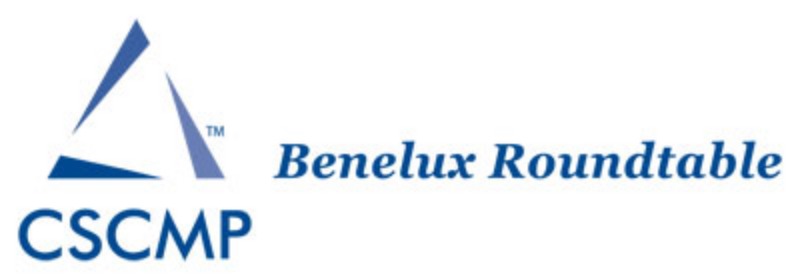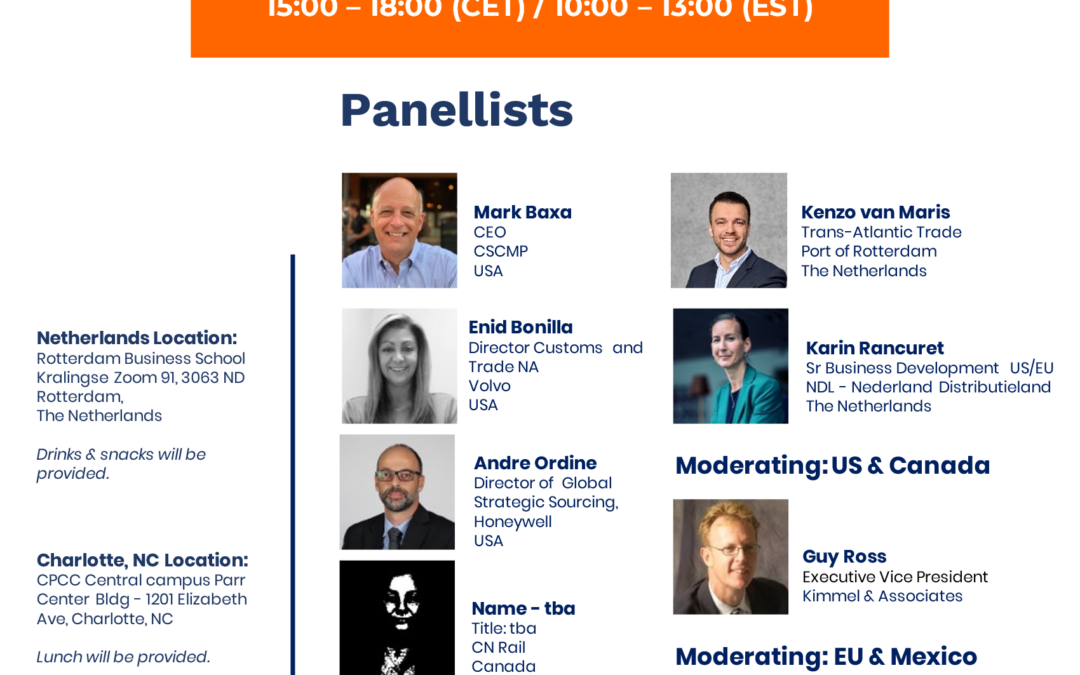The current trade landscape has been thrown into unprecedented turmoil following President Trump’s tariff announcements, with duties reaching as high as 145% on Chinese goods. This has disrupted supply chains and forced companies worldwide to reevaluate their international trade strategies. However, participants of the CSCMP Benelux Global Cross-Border Trade Roundtable held on March 20, 2025, well before ‘Liberation Day’, found themselves well-positioned to navigate these turbulent waters.
Cross-Atlantic CSCMP Roundtable
The CSCMP Benelux and CSCMP Charlotte jointly hosted this Global Cross-Border Trade Roundtable, creating a unique transatlantic forum connecting live events both in the afternoon in Rotterdam, the Netherland and in the morning in Charlotte, North Carolina. It included experts assembled from across the supply chain spectrum including customs officials, transportation executives, nearshoring specialists, and logistics development managers from the US, EU, Mexico, and Canada.
The thematic focus: “What to expect. How to prepare.” was on point. The roundtable specifically addressed how tariff changes and geopolitical shifts impact supply chain strategies—a focus that proved very useful given the dramatic trade policy shifts that followed just weeks later. Moderators Guy Ross and Chrisoula Papadopoulou skilfully managed the discussion, no easy feat considering the panel members dialling in from 2 live events in different time zones and several virtual locations.
Key Insights from the Roundtable
The Nearshoring Advantage
Javier Zarazua, a nearshoring specialist from Mexico, highlighted the high amount of nearshoring activity occurring due to Mexico’s proximity to the US market. His observation that “Mexico was already 20% more competitive than China compared to January 1st, 2025” and prediction that “if Trump stays this course, it will result in huge benefits for Mexico” has proven accurate although it is still too early to say if companies will relocate production from China to Mexico.
Dealing with Uncertainty
Kenzo van Maris from the Port of Rotterdam summarized the current trade environment: “Uncertainty is the word of the day.” His company tackles this issue by implementing scenario planning. As Kenzo noted during the roundtable, if the Suez Canal reopens, “we have a huge risk of congestion and we expect 3 to 5 months before going back to normal.” His advice was to prepare several scenario’s, forcing your organization to rethink the current status quo.
Karin Rancuret from Holland International Distribution Council (HIDC) noted that many international companies had already begun postponing investment decisions—a trend that has accelerated dramatically since the tariff announcements.
Information Sharing and Task Forces
Enid Bonilla, Director Customs and Trade for Volvo North America, detailed their approach to managing regulatory challenges through dedicated task forces. Their task force, weekly meeting updates, newsletters, and centralized information repository have become a model for effectively managing tariff-related disruptions.
Control Tower Approaches to Global Trade Lanes
Andre Ordine from Honeywell discussed their control tower approach to managing over 1,000 trade lanes globally. This strategy—monitoring developments across multiple regions, focusing attention based on spend analysis, and maintaining flexibility—has become essential in the current economic landscape with rapidly changing trade conditions.
Gabriel Lagunes from Canada Rail indicated how geopolitical tensions shape corporate decisions. The question is where to invest, in this opaque and stressful time? Not only the tariff issues are relevant, also the current situation in the Red Sea is impacting Canada. Gabriel already saw the first companies acting on the new situation, although he also points out that for example the automotive industry is a result of 40 years of near-shoring to Canada, you cannot change that overnight.
Conclusion: The Value of Professional Networks in Uncertain Times
The CSCMP Global Cross-Border Trade Roundtable demonstrated the value of professional networks and information exchange in preparing for supply chain disruptions. Participants gained critical insights that helped them anticipate and respond to the tariff chaos that followed. These were some of the key takeaways:
- Ensure compliance – With rapidly changing tariff regulations, compliance has become more critical than ever.
- Be prepared, don’t panic – Companies with established monitoring systems, task forces, and contingency plans have responded more effectively to tariff announcements.
- Rethink your supply chain – The current environment demands fundamental reconsideration of supplier locations, transportation routes, and inventory strategies.
- Embrace constant change – The acceptance that “change is the only constant” has proven essential as companies navigate the rapidly evolving tariff landscape.
For supply chain professionals navigating the current chaos, the message from the CSCMP roundtable is clear: those who collaborate, share information, and prepare for multiple scenarios will be best positioned to weather the storm. As Chrisoula Papadopoulou noted during the closing remarks, “We are all in the same boat.” In these turbulent waters of global trade, that boat is best steered by collaborative professionals who understand that preparation, not panic, is the key to supply chain resilience.
Author: Jeroen Bolt, Vice President of Events

Interested to learn more about the CSCMP Benelux Roundtable and our events? Follow us on LinkedIn.

